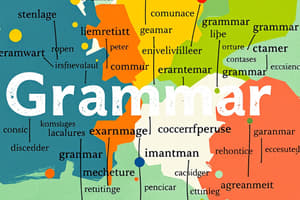Podcast
Questions and Answers
What is phonetics primarily concerned with?
What is phonetics primarily concerned with?
- Study of sound systems within languages
- Study of the meaning of words
- Study of sentence structure
- Study of sounds and their articulation (correct)
Which type of sentence contains two or more independent clauses?
Which type of sentence contains two or more independent clauses?
- Simple
- Simple-Complex
- Compound (correct)
- Complex
What is the main purpose of expository writing?
What is the main purpose of expository writing?
- To inform or explain (correct)
- To persuade the reader
- To tell a story
- To create vivid imagery
What are synonyms?
What are synonyms?
Which of the following best describes a compound-complex sentence?
Which of the following best describes a compound-complex sentence?
What is the origin of the English language primarily attributed to?
What is the origin of the English language primarily attributed to?
Which of the following is NOT a part of speech?
Which of the following is NOT a part of speech?
What differentiates British English from American English?
What differentiates British English from American English?
Flashcards are hidden until you start studying
Study Notes
Overview of the English Language
- Origin: Evolved from a mix of Germanic languages, Latin, and French.
- Global Language: Widely used as a first and second language; official language in many countries.
Phonetics and Phonology
- Phonetics: Study of sounds; includes consonants, vowels, and their articulation.
- Phonology: Study of sound systems; focuses on how sounds function in particular languages.
Grammar
-
Parts of Speech:
- Nouns: Names of people, places, things.
- Verbs: Action or state of being.
- Adjectives: Describes nouns.
- Adverbs: Modifies verbs, adjectives, or other adverbs.
- Pronouns: Replaces nouns.
- Prepositions: Shows relationships between nouns/pronouns.
- Conjunctions: Connects words, phrases, or clauses.
- Interjections: Expresses emotions or exclamations.
-
Sentence Structure:
- Simple: One independent clause.
- Compound: Two or more independent clauses.
- Complex: One independent clause and at least one dependent clause.
- Compound-Complex: At least two independent clauses and one dependent clause.
Vocabulary
- Etymology: Study of word origins; many English words come from Latin, Greek, and Germanic roots.
- Synonyms and Antonyms: Enhance vocabulary and understanding of word meanings.
Writing Styles
- Narrative: Tells a story with characters and a plot.
- Descriptive: Focuses on detail and imagery.
- Expository: Aims to inform or explain.
- Persuasive: Seeks to convince the reader of a particular viewpoint.
Literature
- Genres: Fiction, non-fiction, poetry, drama.
- Elements: Theme, character, plot, setting, and style.
Dialects and Variations
- British English vs. American English: Differences in spelling, vocabulary, and pronunciation.
- Regional Dialects: Variations based on geographic regions, including slang and idioms.
Important Figures
- William Shakespeare: Renowned playwright and poet; contributed significantly to the English language.
- George Orwell: Influential essayist and novelist; known for his works on social criticism.
Language Development
-
Stages:
- Infancy (babbling)
- Early childhood (simple words and phrases)
- Later childhood (complex sentences)
-
Language Acquisition Theories:
- Nativist Theory (Chomsky): Language is innate.
- Learning Theory: Language is acquired through reinforcement and imitation.
English as a Global Language
- Lingua Franca: Common language that enables communication between speakers of different native languages.
- Cultural Influence: English is the primary language of international business, science, technology, and diplomacy.
Overview of the English Language
- Originated from a blend of Germanic languages, Latin influences, and French.
- Functions as a global language, widely spoken as both a first and second language; recognized as an official language in numerous countries.
Phonetics and Phonology
- Phonetics examines the production and perception of speech sounds, including consonants and vowels.
- Phonology analyzes the systems and patterns of sounds in specific languages.
Grammar
- Parts of Speech:
- Nouns: Identify people, places, or things.
- Verbs: Indicate actions or states of existence.
- Adjectives: Provide descriptive attributes for nouns.
- Adverbs: Modify verbs, adjectives, or other adverbs.
- Pronouns: Replace nouns to avoid repetition.
- Prepositions: Illustrate connections between nouns or pronouns.
- Conjunctions: Link words, phrases, or clauses together.
- Interjections: Convey quick emotions or exclamations.
- Sentence Structure:
- Simple: Contains one independent clause.
- Compound: Comprises two or more independent clauses.
- Complex: Features one independent clause and at least one dependent clause.
- Compound-Complex: Includes multiple independent clauses and at least one dependent clause.
Vocabulary
- Etymology: Investigates the origins of words, with many deriving from Latin, Greek, and Germanic sources.
- Understanding synonyms and antonyms enriches vocabulary and clarifies the meanings of words.
Writing Styles
- Narrative: Conveys a story with both characters and a structured plot.
- Descriptive: Emphasizes vivid detail and imagery.
- Expository: Intended to inform or explain concepts to the reader.
- Persuasive: Aims to convince the audience of a specific perspective.
Literature
- Genres include fiction, non-fiction, poetry, and drama.
- Key elements involve theme, character development, plot construction, setting, and stylistic choices.
Dialects and Variations
- British English vs. American English: Notable differences in spelling, vocabulary, and pronunciation exist.
- Regional Dialects arise from geographic diversity, incorporating unique slang and idiomatic expressions.
Important Figures
- William Shakespeare: Influential playwright and poet who greatly impacted the English language.
- George Orwell: Prominent essayist and novelist recognized for his critical social commentary.
Language Development
- Stages of language development:
- Infancy: characterized by babbling.
- Early Childhood: emergence of simple words and phrases.
- Later Childhood: use of complex sentence structures.
- Language Acquisition Theories:
- Nativist Theory (by Chomsky): Asserts that language ability is inherent and instinctive.
- Learning Theory: Proposes that language is learned through imitation and reinforcement.
English as a Global Language
- Serves as a lingua franca, facilitating communication between speakers of varied native languages.
- Holds a significant cultural influence, being the primary language in fields like international business, science, technology, and diplomacy.
Studying That Suits You
Use AI to generate personalized quizzes and flashcards to suit your learning preferences.




